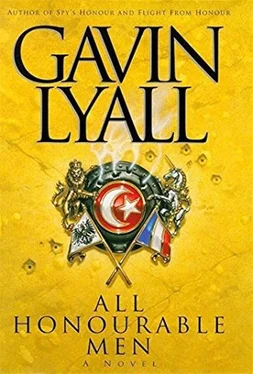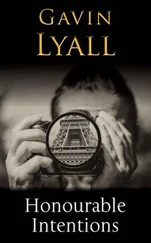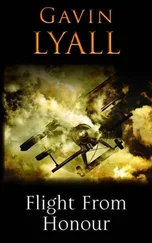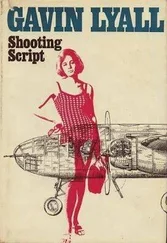Gavin Lyall - All Honourable Men
Здесь есть возможность читать онлайн «Gavin Lyall - All Honourable Men» весь текст электронной книги совершенно бесплатно (целиком полную версию без сокращений). В некоторых случаях можно слушать аудио, скачать через торрент в формате fb2 и присутствует краткое содержание. Год выпуска: 1997, Издательство: Bloomsbury Publishing, Жанр: Шпионский детектив, Исторический детектив, на английском языке. Описание произведения, (предисловие) а так же отзывы посетителей доступны на портале библиотеки ЛибКат.
- Название:All Honourable Men
- Автор:
- Издательство:Bloomsbury Publishing
- Жанр:
- Год:1997
- ISBN:нет данных
- Рейтинг книги:5 / 5. Голосов: 1
-
Избранное:Добавить в избранное
- Отзывы:
-
Ваша оценка:
- 100
- 1
- 2
- 3
- 4
- 5
All Honourable Men: краткое содержание, описание и аннотация
Предлагаем к чтению аннотацию, описание, краткое содержание или предисловие (зависит от того, что написал сам автор книги «All Honourable Men»). Если вы не нашли необходимую информацию о книге — напишите в комментариях, мы постараемся отыскать её.
All Honourable Men — читать онлайн бесплатно полную книгу (весь текст) целиком
Ниже представлен текст книги, разбитый по страницам. Система сохранения места последней прочитанной страницы, позволяет с удобством читать онлайн бесплатно книгу «All Honourable Men», без необходимости каждый раз заново искать на чём Вы остановились. Поставьте закладку, и сможете в любой момент перейти на страницу, на которой закончили чтение.
Интервал:
Закладка:
Machine-gun bullets clattered into the wall behind him. He cringed as flat as he could, and glanced back – and there was Hakim and another, standing in the gateway, laughing unconcernedly. If the Englishman could show his disdain for shot and shell by taking bearings on shell scrapes, then by God they weren’t going to be outdone.
He screamed: “Get back!” and grabbed Hakim in a rugby tackle and tried to fling him through the gateway. The second burst of machine-gun fire arrived – accurately – and they all three collapsed inside amid screeching ricochets and stone fragments.
Once they had sorted themselves out, the other Arab lay groaning with a bullet through the stomach. In a good field hospital he might – might – survive. Out here it was a slow death in a lot of pain.
When he had been carried to the cellar and Hakim had been persuaded to order all the others back down, Ranklin turned on him. “D’you want these Ottoman conscripts to defeat your father ? D’you want him tried for treason? Or more likely, just executed here, like a dog, to be rid of him?” He over-rode the indignant protests. “You’ve lost two men already and not caused the enemy a single casualty! Is that good? You have to be a great -” perhaps soldat wasn’t much of a compliment: try “warrior” “- guerrier like your father, and you will defeat those farmers out there. But by being better guerriers than they. Now, let me see the map.”
It had got left upstairs but there were plenty of volunteers; Ranklin made them wait until the next shell had burst. With the map spread on the floor, he used the surveyors’ own instruments to plot the bearing: 155 degrees. The gun could be on the edge of the plateau or down in the dry riverbed, further along than they’d had to go. His bet was the riverbed: up on rock, the gun would hop around with the recoil, needing elaborate relaying after each shot.
But to hit the wall of the ravine, the other gun must be on the far side of it, again in the riverbed but half a mile or more from the first – probably well out of sight of it. Dividing your guns was unconventional, but being able to fire on both sides of the monastery as well as the front was sensible. Zurga was no fool.
Perhaps Hakim was beginning to realise that now, and see the future as Zurga planned it: more casualties if he exposed his men, being overwhelmed by attacking troops if he didn’t. The men crowding the cellar stared at him openly, waiting to see if their enemy or their leader was in control. This was where you needed discipline, not courage: even in an army the situation would be bad, but this brave mob could fall completely apart.
“ I would post one man upstairs to watch,” Ranklin said conversationally. “A sensible one. Have him shout down that he’s all right after every shell-burst. You’ll know when they’re going to attack: the bugle calls will stop, both guns will fire together – as fast as they can. The machine-gun, too.”
In a lamplit corner, Lady Kelso was carefully tearing the clothing from the newly wounded Arab’s body. He screamed as the air reached the wound.
Perhaps the scream helped. Hakim gave out authoritative orders – and was obeyed. Lady Kelso came past to rinse her hands in a brass bowl, leaving the water rust-red in the lamplight. “Is this the ‘worse’ you expected?”
“Artillery. Mountain guns. I should have thought of them.”
“There’s nothing to be done about them, I assume.”
“There might be . . .” Only two guns, too far apart to support each other if attacked . . .
She waited, but he was silent, thinking. She turned away.
“It’s all right. Not asking questions is one of the things I’m best at.”
“Just providing answers.”
She paused, then said: “I suppose so . . . Too often, the answer used to be just me. But now . . .”
She went back to the wounded Arab as Hakim returned to ask: “And is that all we can do?”
“No. If you’ve really got a secret back way out, let me take half a dozen men and I might capture one of those guns for you.”
25
The pass that O’Gilroy found between the foothills and the Peak existed, but nobody had used it before because it was an unnecessary loop, the route up the tributary and then along the dry riverbed being flatter and easier. This way meant weaving around rocks and ducking under tree branches, but on the far side it could also mean the advantage of the high ground and O’Gilroy did know infantry tactics. Anybody who had fought the Boers, and lived, had learnt more than the Army taught.
They had barely started upwards when a faint noise brought their heads up. Bertie listened, then called: “Was that a Maxim gun?”
“Probly. They’ve got one.”
They plodded on, and were still below the crest when they heard the bugle sound, and the first gun went off. All seemed well distant and O’Gilroy scowled to himself; the detour seemed to have been a waste of time.
The bugle called again and a second gun fired – far closer. In fact, just over the crest. He dismounted, tied his horse to a tree, and went forward on foot. By the time he was over the crest, he had guessed at a pattern. The machine-gun had no part in it: it was firing random short bursts, probably replying to the single shots which must come from the monastery. But the bugle calls – from somewhere in sight of the monastery – were controlling the fire of the guns, themselves with no sight of the target.
The first gun was far off to his right. But the second was in the riverbed almost directly below him. It fired again and he placed it exactly. Looking down on it from behind, he was in an infantryman’s dream and a gunner’s nightmare.
* * *
The secret way started by going out of the back of the monastery by the rough-fenced paddock. The dozen horses there – nothing like enough for the whole band – were frightened by the explosions and would soon be hit by them. But what could anybody do? The next step, it seemed, was to climb down a well, an idea which didn’t appeal to Ranklin at all. But it appeared that the wide, irregular-shaped shaft had been hacked down, centuries before, to intercept a small underground stream. So it led to a tunnel rather than just plunged below the local water table.
They swarmed down a knotted rope, sometimes crawling backwards down a slope of rock, sometimes dangling free and going hand over hand. It was perhaps thirty feet in all, one of those distances that doesn’t sound much but is enormous when you’re lowering yourself into increasing darkness and damp. And then he was standing calf-deep in freezing gushing water waiting for the last two men to come down and for one already there to get a storm lantern lit.
In fact they moved off before the last man was down, a devil-take-the-hindmost attitude that assumed each man could keep up and nobody was really in command. For the moment nobody needed to be: they were simply following the tunnel, stumbling and slipping on a downward path. But if any decisions came to be made, Ranklin realised he would have to start imposing his will. Without a common language that could be tricky, particularly if you were to do it in wheezes and grunts from the back of the queue.
Then he realised he could see – vaguely – where he was putting his feet, and another turn brought dull green light ahead: green because the outside world was blocked by a scrawny bush, perhaps growing naturally in the dampness, perhaps planted to hide the fissure through which the stream spilled down into the ravine.
They were still fifty feet up, but away from the spattering water there was enough fallen rock to make it relatively easy to scramble down. Or up, Ranklin reflected, but no invader could count on climbing that well.
Читать дальшеИнтервал:
Закладка:
Похожие книги на «All Honourable Men»
Представляем Вашему вниманию похожие книги на «All Honourable Men» списком для выбора. Мы отобрали схожую по названию и смыслу литературу в надежде предоставить читателям больше вариантов отыскать новые, интересные, ещё непрочитанные произведения.
Обсуждение, отзывы о книге «All Honourable Men» и просто собственные мнения читателей. Оставьте ваши комментарии, напишите, что Вы думаете о произведении, его смысле или главных героях. Укажите что конкретно понравилось, а что нет, и почему Вы так считаете.











